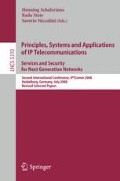Abstract
Software implementing open standards like SIP evolves over time, and often during the first years of deployment, products are either immature or do not implement the whole standard but rather only a subset. As a result, messages compliant to the standard are sometimes wrongly rejected and communication fails. In this paper we describe a novel approach called Babel-SIP for increasing the rate of acceptance for SIP messages.
Babel-SIP is a filter that is put in front of a SIP parser and analyzes incoming SIP messages. It gradually learns which messages are likely to be accepted by the parser, and which are not. Those classified as probably rejected are then adapted such that the probability for acceptance is increased. In a number of experiments we demonstrate that our filter is able to drastically increase the acceptance rate of problematic SIP REGISTER and INVITE messages. Additionally we show that our approach can be used to analyze the faulty behavior of a SIP parser by using the generated decision trees.
Access this chapter
Tax calculation will be finalised at checkout
Purchases are for personal use only
Preview
Unable to display preview. Download preview PDF.
References
Rosenberg, J., Schulzrinne, H., Camarillo, G., Johnston, A., Peterson, J., Sparks, R., Handley, M., Schooler, E.: SIP: Session Initiation Protocol. RFC 3261 (June 2002)
Wilking, D., Röfer, T.: Realtime Object Recognition Using Decision Tree Learning. In: RoboCup 2004: Robot World Cup VII, pp. 556–563. Springer, Heidelberg (2005)
Heisig, S., Moyle, S.: Using Model Trees to Characterize Computer Resource Usage. In: 1st ACM SIGSOFT Workshop on Self-Managed Systems, pp. 80–84 (2004)
Abbes, T., Bouhoula, A., Rusinowitch, M.: Protocol Analysis in Intrusion Detection Using Decision Trees. In: International Conference on Information Technology: Coding and Computing (ITCC 2004), pp. 404–408 (2004)
Kang, H., Zhang, Z., Ranjan, S., Nucci, A.: SIP-based VoIP Traffic Behavior Profiling and Its Applications. In: MineNet 2007, pp. 39–44 (2007)
Aichernig, B., Peischl, B., Weiglhofer, M., Wotawa, F.: Protocol Conformance Testing a SIP Registrar: an Industrial Application of Formal Methods. In: 5th IEEE Int. Conference on Software Engineering and Formal Methods, pp. 215–224 (2007)
Abdelnur, H., State, R., Festor, O.: KiF: A Stateful SIP Fuzzer. In: 1st Int. Conference on Principles, Systems and Applications of IP Telecommunications, iptcomm.org (2007)
Acharya, A., Wand, X., Wrigth, C., Banerjee, N., Sengupta, B.: Real-time Monitoring of SIP Infrastructure Using Message Classification. In: MineNet 2007, pp. 45–50 (2007)
Rosenberg, J., Schulzrinne, H.: Reliability of provisional responses in session initiation protocol (sip). RFC 3262 (June 2002)
Rosenberg, J., Schulzrinne, H.: Session initiation protocol (sip): Locating sip servers. RFC 3262 (June 2002)
Roach, A.B.: Session initiation protocol (sip)-specific event notification. RFC 3265 (June 2002)
Sparks, R.: The session initiation protocol (sip) refer method. RFC 3515 (April 2003)
Rosenberg, J.: The session initiation protocol (sip) update method. RFC 3311 (September 2002)
Johnston, A., Donovan, S., Sparks, R., Cunningham, C., Summers, K.: Session initiation protocol (sip) basic call flow examples. RFC 3665 (December 2003)
Johnston, A., Donovan, S., Sparks, R., Cunningham, C., Summers, K.: Session initiation protocol (sip) public switched telephone network (pstn) call flows. RFC 3666 (Decmember (2003)
Marshall, W.: Private session initiation protocol (sip) extensions for media authorization. RFC 3313 (January 2003)
Peterson, J.: A privacy mechanism for the session initiation protocol (sip). RFC 3323 (November 2002)
Arkko, J., Torvinen, V., Camarillo, G., Niemi, A., Haukka, T.: Security Mechanism Agreement for the Session Initiation Protocol (SIP). RFC 3329 (January 2003)
Mitchell, T.: Machine Learning. McGraw-Hill, New York (1997)
Witten, I., Frank, E.: Data Mining: Practical Machine Learning Tools and Techniques. Morgan Kaufmann, San Francisco (2005)
Author information
Authors and Affiliations
Editor information
Editors and Affiliations
Rights and permissions
Copyright information
© 2008 Springer-Verlag Berlin Heidelberg
About this paper
Cite this paper
Hess, A., Nussbaumer, M., Hlavacs, H., Hummel, K.A. (2008). Automatic Adaptation and Analysis of SIP Headers Using Decision Trees. In: Schulzrinne, H., State, R., Niccolini, S. (eds) Principles, Systems and Applications of IP Telecommunications. Services and Security for Next Generation Networks. IPTComm 2008. Lecture Notes in Computer Science, vol 5310. Springer, Berlin, Heidelberg. https://doi.org/10.1007/978-3-540-89054-6_4
Download citation
DOI: https://doi.org/10.1007/978-3-540-89054-6_4
Publisher Name: Springer, Berlin, Heidelberg
Print ISBN: 978-3-540-89053-9
Online ISBN: 978-3-540-89054-6
eBook Packages: Computer ScienceComputer Science (R0)

